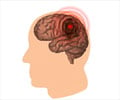A new study says that adult daughters caring for a parent recovering from a stroke are more prone to get into depression than sons.

"Stroke can be particularly challenging for families," says Bastawrous, a masters candidate at the University of Toronto.
"Taking care of elderly parents can bring out family strengths and family weaknesses."
The study said that although a parent-child bond can result in excellent care but strained relationships before or following the stroke increases depression in daughters.
The study found that adult daughters placed greater importance on family relationships than sons and, in turn, were more negatively impacted by poor relationships with their parent.
"When a parent has a stroke, adult children often become their primary caregivers," says Heart and Stroke Foundation spokesperson Dr. Michael Hill.
Advertisement
Study co-author Dr. Jill Cameron says that stroke care interventions are overwhelmingly designed for spouses and yet, 62 percent of stroke caregivers are adult children.
Advertisement
"They aren't trained but their role is essential."
Cameron suggests creating work environments that support family members caring for stroke survivors and says that caregivers should be recognized as members of the care team.
"Family caregivers are critical to stroke recovery and typically assume major care roles that are frequently costly to their financial, social, and emotional well-being," says Dr. Antoine Hakim, spokesperson for the Canadian Stroke Network.
Source-ANI















